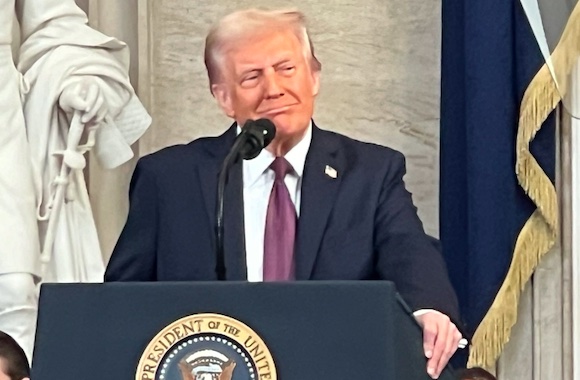
Key Takeaways
- The Trump administration proposed the 'Compact for Academic Excellence in Higher Education,' which offers federal funding incentives to universities that implement specific reforms, including a five-year tuition freeze, bans on race and sex considerations in admissions and hiring, and limitations on foreign enrollment.
- Several prestigious universities have been targeted for this offering, with UT-Austin expressing interest, while critics accuse the administration of using coercive tactics and warn of potential legal issues regarding the compact's conditions.
President Donald Trump is testing out the art of the deal on higher education.
His administration this week sent out the “Compact for Academic Excellence in Higher Education” to universities that offers preferential treatment for federal funding if they enact several reforms, such as a five-year tuition freeze, forbidding the use of race or sex in hiring and admissions, institutional neutrality, limiting foreign enrollment to 15 percent, and adopting the traditional definition of male and female, among other provisions.
The compact also “asks universities to ensure a ‘vibrant marketplace of ideas on campus’ and to bar employees from expressing political views on behalf of their employer, unless the matter affects the school,” The Wall Street Journal reported. “It seeks to create a more welcoming environment for conservatives, asking colleges to make governance changes and abolish departments that ‘purposefully punish, belittle, and even spark violence against conservative ideas.'”
The compact states in part:
Students shall be treated as individuals and not on the basis of their immutable characteristics, with
due exceptions for sex-based privacy, safety, and fairness. Women’s equality requires single-sex spaces, such as bathrooms and locker rooms, and fair competition, such as in sports. Institutions commit to defining and otherwise interpreting “male,” “female,” “woman,” and “man” according to reproductive function and biological processes. Otherwise, immutable characteristics, particularly race, do not permit unequal treatment, including in grading as well as access to buildings, spaces, scholarships, programming, and other university resources.
The compact has been initially offered to Vanderbilt University, Dartmouth College, the University of Pennsylvania, the University of Southern California, Massachusetts Institute of Technology, the University of Texas at Austin, the University of Arizona, Brown University and the University of Virginia, the Journal reported.
Those that agree will get “multiple positive benefits,” including “substantial and meaningful federal grants,” according to the newspaper.
“Our hope is that a lot of schools see that this is highly reasonable,” May Mailman, senior adviser for special projects at the White House, told the Journal.
UT-Austin is considering the deal. UT System Board of Regents Chair Kevin Eltife told the Texas Tribune its leaders are honored UT-Austin was selected to be part of the proposal.
“We enthusiastically look forward to engaging with university officials and reviewing the compact immediately,” he said. “Higher education has been at a crossroads in recent years, and we have worked … to implement sweeping changes for the benefit of our students and to strengthen our institutions to best serve the people of Texas.”
Critics are already crying foul.
“This is extortion, plain and simple,” wrote Erwin Chemerinsky, dean of UC Berkeley’s law school, in a New York Times op-ed.
“It is not hyperbole to say that the future of higher education in America requires that every university reject it. If any schools capitulate, the pressure will be enormous on all to fold. The only solution is solidarity and collective action against this effort at federal control over higher education.”
The American Council on Education also took a cautionary stance.
“ACE Senior Vice President for Government Relations and National Engagement Jon Fansmith told The Chronicle of Higher Education that the compact might not hold up in court because it involves placing criteria into a grant program that gives an advantage for aligning with the administration’s priorities. In addition, some grant programs, as well as direct student loans and Pell Grants, have eligibility standards that are set in law, and it is not clear if the compact can circumvent that,” the group reported.
The compact states: “Institutions of higher education are free to develop models and values other than
those below, if the institution elects to forego federal benefits.”
MORE: Embattled Fed Governor Lisa Cook faces plagiarism claims, cancel culture ties











